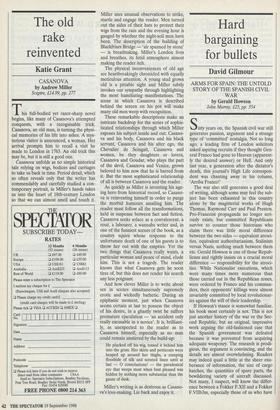The old rake reinvented
Katie Grant
CASANOVA by Andrew Miller Sceptre, £14.99, pp. 277 This full-bodied yet razor-sharp novel begins, like many of Casanova's attempted conquests, with a recognisable trick. Casanova, an old man, is turning the physi- cal memories of his life into ashes. A mys- terious visitor is announced, a woman. Her arrival prompts him to recall a visit he made to London in 1763. An old trick this may be, but it is still a good one.
Casanova unfolds as no simple historical tale relying on wigs, bodices and carriages to take us back in time. Period detail, which so often reveals only that the writer has commendably and carefully studied a con- temporary portrait, in Miller's hands takes us into the heart of 18th-century London so that we can almost smell and touch it Miller uses unusual observations to strike, startle and engage the reader. Men turned out the sides of their hats to protect their wigs from the rain and the evening hour is gauged by whether the night-soil men have been. The description of the building of Blackfriars Bridge — 'air spanned by stone' — is breathtaking. Miller's London lives and breathes, its fetid atmosphere almost making the reader itch.
The physical inconveniences of old age are heartbreakingly chronicled with equally meticulous attention. A young stud grown old is a pitiable sight and Miller subtly invokes our sympathy through highlighting the most humiliating manifestations. The scene in which Casanova is described behind the screen on his pot will make many old men weep with recognition.
These remarkable descriptions make an intricate backdrop for the series of sophis- ticated relationships through which Miller exposes his subject inside and out: Casano- va and his body, Casanova and his black servant, Casanova and his alter ego, the Chevalier de Seingalt, Casanova and women, be they daughters or lovers, Casanova and Goudar, who plays the part of the devil, Casanova and Venice, grown beloved to him now that he is barred from it. But the most sophisticated relationship of all is between Casanova and the reader.
As quickly as Miller is inventing his age- ing hero from historical record, so Casano- va is reinventing himself in order to purge the morbid humours assailing him. The reader must follow all the transformations, held in suspense between fact and fiction. Casanova seeks solace as a convalescent, a roué, a labourer, a wannabe writer and, in one of the funniest scenes of the book, as a country squire whose response to the unfortunate death of one of his guests is to throw her out with the empties. Yet the two things that Casanova really wants, a particular woman and peace of mind, elude him. This is not a tragedy. The reader knows that what Casanova gets he soon tires of, but this does not render his search any less poignant.
And how clever Miller is to write about sex in scenes simultaneously supremely erotic and wickedly bathetic. During an epiphanic moment, just when Casanova seems certain at last to possess the object of his desire, in a ghastly twist he suffers premature ejaculation — 'an accident only really excusable in a novice'. It is, brilliant- ly, as unexpected to the reader as to Casanova himself, especially as no man could remain unstirred by the build-up:
He plucked off his wig, tossed it behind him into the grass. Her skirts and petticoats were heaped up around her thighs, a creeping floodtide of silk and scented linen until at last — 0 consolazione! — the paradoxical eye that weeps most when best pleased was hidden by nothing more substantial than the gauze of dusk.
Miller's writing is as dextrous as Casano- va's love-making. Lie back and enjoy it.










































































 Previous page
Previous page